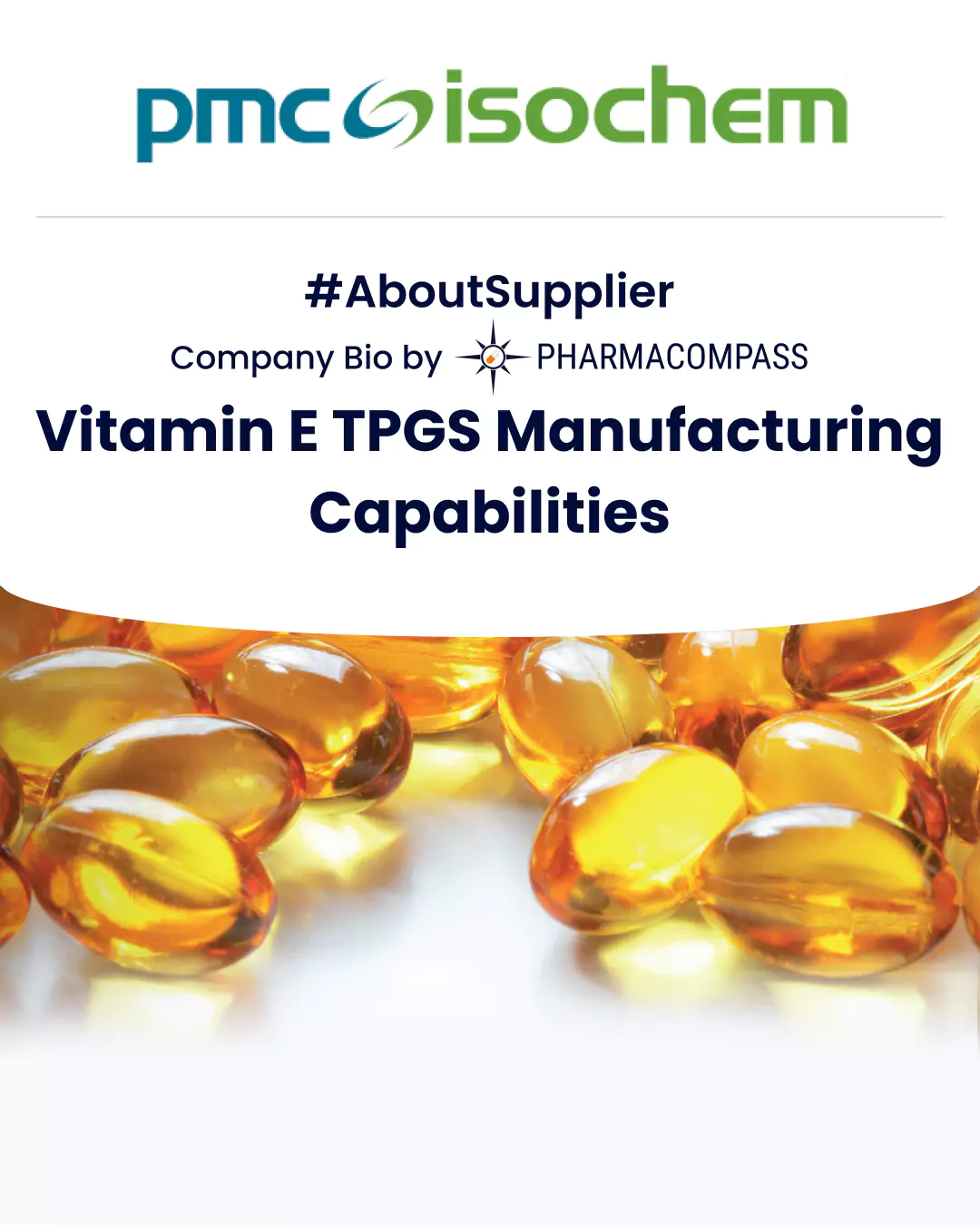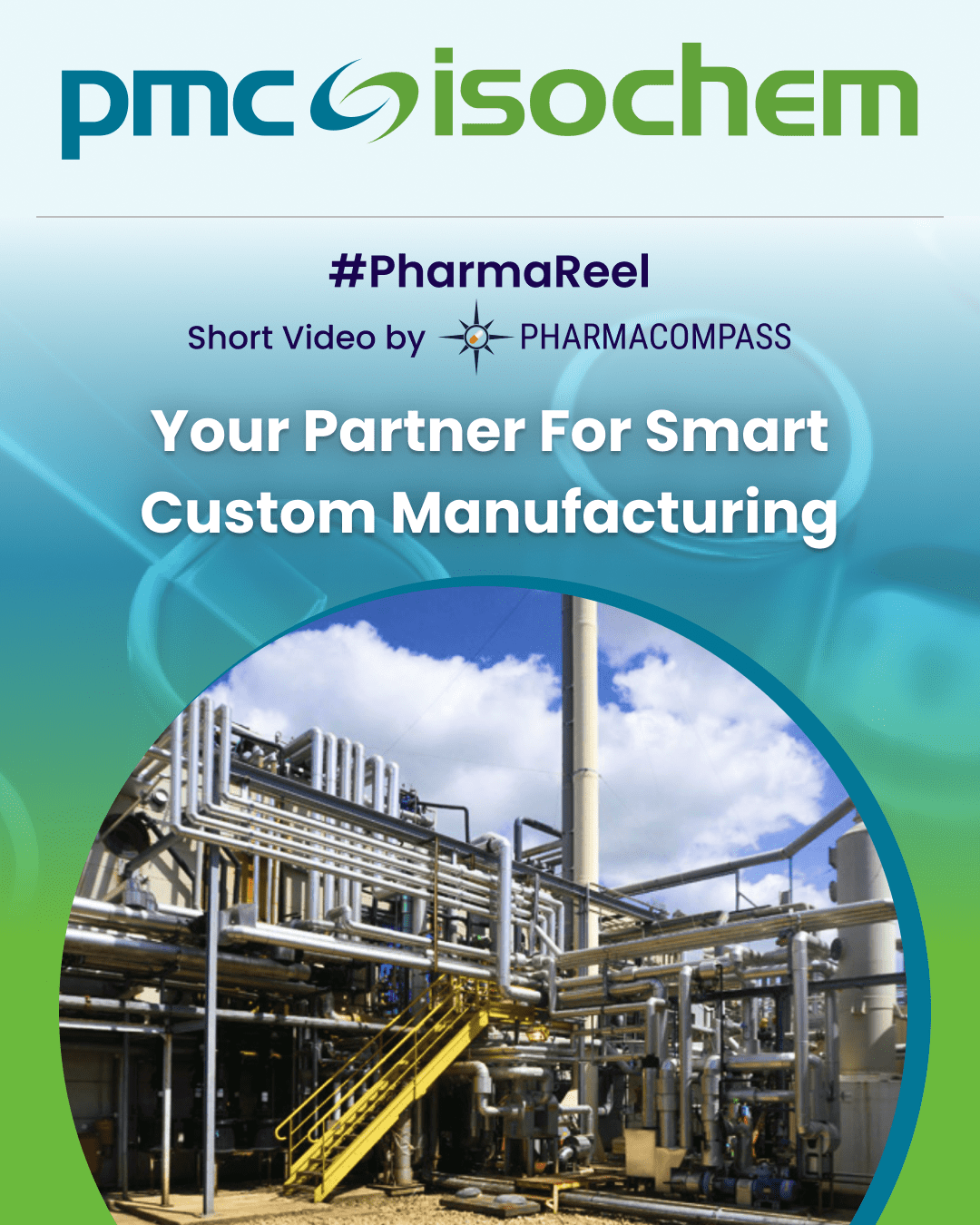
By PharmaCompass
2022-10-28
Impressions: 2572
Overview of PMC Isochem's Vitamin E TPGS (Tocophersolan), a multirole excipient for pharmaceutical drug delivery, on PharmaCompass.
What is Vitamin E TPGS?
Vitamin E TPGS is a multirole excipient for pharmaceutical drug delivery and is a water soluble derivative of natural Vitamin E. Vitamin E TPGS is chemically known as d-alpha-tocopheryl polyethylene glycol succinate or TPGS. It is formed along with polyethylene glycol 1000 by esterification of d-alpha-tocopheryl polyethylene glycol succinate.
Vitamin E has been linked to various other functions, including antioxidant, anti-thrombolytic and other therapeutic effects. d-alpha-tocopheryl polyethylene glycol succinate (TPGS) has various interesting properties that can help innovators to address drug delivery challenges. Vitamin E TPGS-based formulations can be administered through the oral, mucosal, nasal, parenteral, ophthalmics and dermal routes. These formulations are used as nutrition supplements or dietary supplements.
Vitamin E TPGS is used in various drug formulations such as tablets, capsules (hard and soft), solutions, creams, nanocrystals, nanosuspensions, solid dispersions, adjuvants in vaccine systems, self-emulsifying/micro emulsifying drug delivery systems (SEDDS/SMEDDS) and lipid based formulations including solid lipid nanoparticles (SLNs).
TPGS, also known as Tocophersolan (Tocofersolan) has gained a lot of attention as a versatile excipient in different biomedical applications including drug delivery systems and nutraceuticals. A molecular biomaterial, it exhibits excellent drug delivery capability that is based on its special amphiphilic structure. where each molecule consists of hydrophilic and lipophilic moieties.
Vitamin E TPGS or Tocophersolan is widely used to improve the bioavailability of several active pharmaceutical ingredients. It is also used as a molecular biomaterial for drug delivery and absorption enhancer as well as a permeation enhancer in various pharmaceutical drug delivery systems.
Furthermore, Vitamin E TPGS-based formulations can also be used in a variety of applications, such as dietary supplements, nutraceuticals, food & beverage, cosmetic & personal care and animal nutrition. In fact, these markets, too, require innovative solutions and could benefit from TPGS’ unique properties.
What are the different properties of Vitamin E TPGS?
Vitamin E PEG-1000-succinate (Tocophersolan) is a unique and pleiotropic polymer that is a polymeric, synthetic version of vitamin E.
Vitamin E TPGS, also known as tocopheryl polyethylene glycol succinate, is a white to light tan water-soluble waxy solid with low melting point that is chemically stable to heat, oxygen and light.
Vitamin E PEG-1000-succinate is a non-ionic surfactant that is a water soluble derivative of natural Vitamin E. As a novel non-ionic surfactant, Vitamin E TPGS is a macromolecule comprising a lipophilic alkyl tail and a hydrophilic polar head with amphiphilic properties. It can form stable micelles in aqueous vehicles at concentrations as low as 0.02 wt%.
Tocophersolan can also act as a P-glycoprotein (P-gp) inhibitor. It is used as an excipient to treat multidrug resistance (MDR) and to improve the oral bioavailability of many anticancer drugs.
Additionally, d-alpha-tocopheryl polyethylene glycol succinate (TPGS) exhibits antioxidant effects. making it a popular component in cosmetics and pharmaceuticals.
Tocofersolan can be used as an excellent drug solubilizer and emulsifier.
Since the Food and Drug Administration (FDA) approved Vitamin E PEG-1000-succinate as a safe pharmaceutical adjuvant, many TPGS-based drug delivery systems (DDS) have been developed.
Vitamin E TPGS-based formulations can be administered through the oral, mucosal, nasal, parenteral, ophthalmics and dermal routes.
What are the applications of Vitamin E TPGS in the pharmaceutical industry?
For several years, Vitamin E TPGS has been administered orally, but many new delivery applications such as parenteral, nasal, ophthalmic and dermal deliveries have also been investigated. Since it was approved by FDA as a safe pharmaceutical adjuvant, TPGS has been widely used as a molecular biomaterial for drug delivery, surfactant, drug solubilizer, a stabilizer in various drug delivery systems and a P-gp inhibitor for enhancing bioavailability and reversing MDR.
The applications of Vitamin E TPGS are noted below:
- As the hydrophobic portion can trap hydrophobic drugs and the formulations can be stabilized by the hydrophilic portion, TPGS or tocopheryl polyethylene glycol succinate can be used as a surface stabilizer for drug formulations.
- Vitamin E TPGS is used as a permeation enhancer and bioavailability enhancer of hydrophobic drugs, a plasticizer for hot melt extrusion and a stabilizer for amorphous solid dispersion.
- TPGS has surfactant properties that improve the solubilization of drugs that are poorly water soluble. As a result, Vitamin E TPGS is used in drug delivery as a drug solubilizer, an absorption enhancer and a permeation enhancer.
- Tocofersolan-based drug formulations have numerous advantages for improving the bioavailability of oral dosage forms.
- Vitamin E TPGS is used as a nutrition supplement, dietary supplement, plasticizer of film, anticancer reagent, etc.
- The biological and physicochemical properties of TPGS offer several advantages for drug delivery applications, including high biocompatibility.
- TPGS inhibits the efflux of P-glycoprotein that improves drug permeability.
- Tocofersolan (tocopheryl polyethylene glycol succinate) is widely used in the fabrication of nanodrugs or other formulations for many poorly water-soluble or permeable drugs, particularly for biopharmaceutics classification system (BCS) class II and IV drugs with poor water solubility or permeability.
- Vit E TPGS is used as a stabilizer for amorphous drug forms.
- TPGS-based polymers are widely used in the drug delivery system, where they can improve the drug’s encapsulation efficiency, intracellular cell uptake and therapeutic efficacy in vitro and in vivo.
What are the Vitamin E TPGS manufacturing services that PMC Isochem offers?
PMC Isochem is a custom development & manufacturing organization that provides cGMP intermediates, active pharmaceutical ingredients (APIs), excipients and polymers for pharmaceutical drug delivery solutions.
It offers Vitamin E TPGS, a water soluble derivative of natural Vitamin E that serves as a multirole excipient in pharmaceutical drug delivery innovation. Vit E TPGS has been used primarily in oral dosage forms for many years, but new delivery methods such as parenteral, nasal, ophthalmic and dermal are being investigated.
Vitamin E TPGS functions as a solubilizer of poorly water soluble drugs, an absorption enhancer, a permeation enhancer by inhibiting P-glycoprotein efflux, a stabilizer of amorphous drug dispersion and a functional ingredient in lipid-based formulations and molecular biomaterial for drug delivery. In melt granulation/extrusion processing, it also acts as a thermal binder.
PMC Isochem vitamin E TPGS is made by esterification of the carboxylic group of crystalline d-alpha-tocopheryl succinate with polyethylene glycol 1000. The manufacturing process has been thoroughly validated. In order to secure its supply chain, PMC Isochem has multi-sourced approvals of key raw materials that comply with Pharmacopoeia.
PMC Isochem Vit E TPGS is produced in France in state-of-the-art FDA-audited cGMP facilities. French drug authority, ANSM (Agence Nationale de Sécurité du Médicament), has granted a certificate of GMP compliance for the production of Vitamin E TPGS to PMC Isochem.
For the past ten years, PMC Isochem has been producing GMP USP/NF compliant ISODEL® Vitamin E TPGS. PMC Isochem has a DMF Type II for the production of active pharmaceutical ingredients (APIs). PMC Isochem has a steady supply of ISODEL™ Vitamin E TPGS, with manufacturing capacity spread across two GMP FDA-audited facilities.
PMC Isochem offers ISODEL™ TPGS analogues with polyethylene glycol chain molecular weights of 200, 300, 400, 1,500, 2,000 and 4,000 g/mol. Standard TPGS has a polyethylene glycol molecular weight of 1,000 g/mol.
The PharmaCompass Newsletter – Sign Up, Stay Ahead
Feedback, help us to improve. Click here
Image Credit : Biosynthesis, tech advancements by PharmaCompass license under CC BY 2.0
“ The article is based on the information available in public and which the author believes to be true. The author is not disseminating any information, which the author believes or knows, is confidential or in conflict with the privacy of any person. The views expressed or information supplied through this article is mere opinion and observation of the author. The author does not intend to defame, insult or, cause loss or damage to anyone, in any manner, through this article.”






